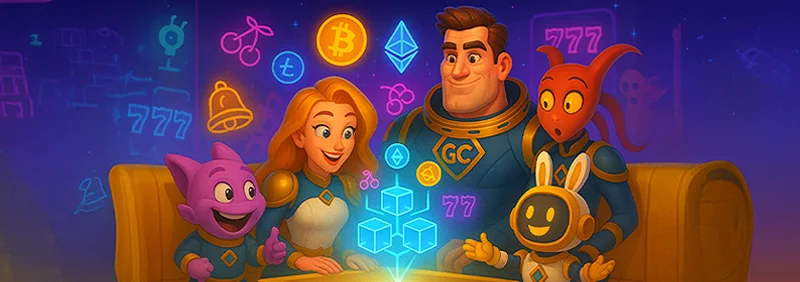Home > Casino Lab > Casino Web3 > Blockchain and Casinos: How Decentralization Is Changing Online Gambling
Blockchain and Casinos: How Decentralization Is Changing Online Gambling
The emergence of blockchain technology is revolutionizing multiple industries, and online gambling is among the most impacted. For decades, traditional casinos have relied on centralized systems, asking players to trust the operator without providing full transparency. This lack of visibility has often raised questions about fairness, security, and the integrity of payouts.
With blockchain, a new era of gambling is unfolding—an era defined by decentralization, verifiability, and independence from intermediaries. In this model, every transaction, every bet, and every game outcome can be recorded on a transparent ledger, creating an unprecedented level of accountability. This is not a small shift but a fundamental transformation in the way players experience and trust online casinos.

Blockchain in the World of Online Casinos
Blockchain is essentially a decentralized digital ledger, distributed across multiple nodes and resistant to manipulation. Within the gambling industry, this means that game results are no longer hidden behind proprietary systems but are instead made auditable through cryptographic algorithms.
Players are no longer forced to trust the casino blindly; they can independently verify outcomes through Provably Fair systems that confirm randomness. At the same time, payments are no longer routed through banks or third-party processors.
Instead, cryptocurrencies and tokens enable instant, borderless transactions that are recorded permanently on the blockchain. This combination of fairness and efficiency is shifting the balance of power from centralized operators to players who demand proof, not promises.
The Advantages of Blockchain Gambling
The adoption of blockchain in online casinos introduces several key benefits that are reshaping the industry. First and foremost, it delivers transparency and fairness. Players can now verify in real time whether the results of a game were truly random, eliminating one of the biggest trust gaps that has historically plagued online casinos.
Furthermore, blockchain radically improves the payment experience. Deposits and withdrawals that once took days can now be completed in minutes or seconds, often with lower fees and without geographical restrictions. Privacy is another cornerstone, as blockchain systems allow users to play and transact without exposing sensitive financial data.
Beyond payments, blockchain enables new community-driven structures such as DAO casinos, where players are no longer passive consumers but active participants who can vote on policies, share in revenues, or even influence the direction of the platform. This democratization of gambling marks a dramatic break from the centralized models of the past.
The Challenges Ahead
Despite its promise, blockchain gambling is not without obstacles. The first and most pressing issue is regulation, as many jurisdictions have yet to establish clear rules governing decentralized casinos. The volatility of cryptocurrencies also creates challenges, as the value of winnings can fluctuate dramatically in a short time. Finally, adoption remains limited by the technical complexity of blockchain.
Not all players are comfortable managing wallets, private keys, and tokens, which can create barriers to entry for mainstream audiences. Nevertheless, these challenges are increasingly being addressed by the introduction of stablecoins, user-friendly wallets, and hybrid platforms that combine the familiarity of traditional casinos with the transparency of blockchain.
The Future of Decentralized Casinos
The integration of blockchain into iGaming is still in its infancy, but its potential is vast. In the years to come, we can expect blockchain casinos to rely more heavily on stablecoins to mitigate volatility, expand into Metaverse environments where players interact in immersive VR casinos, and develop more advanced models of community governance.
As the technology matures, decentralized casinos could redefine the very foundation of online gambling, setting new industry standards for fairness, transparency, and accessibility. For players, this means more control, more trust, and a completely new way of engaging with their favorite games.
Conclusion
Blockchain is not just a technological trend—it is a disruptive force that is rewriting the rules of online gambling.
By ensuring provable fairness, delivering instant and borderless payments, and opening the door to player-owned ecosystems, blockchain casinos are transforming how people gamble online. For operators, it represents an opportunity to build stronger trust and appeal to the new generation of blockchain-native players. For players, it is the dawn of a new age where gambling is not only entertaining but also transparent and secure.

